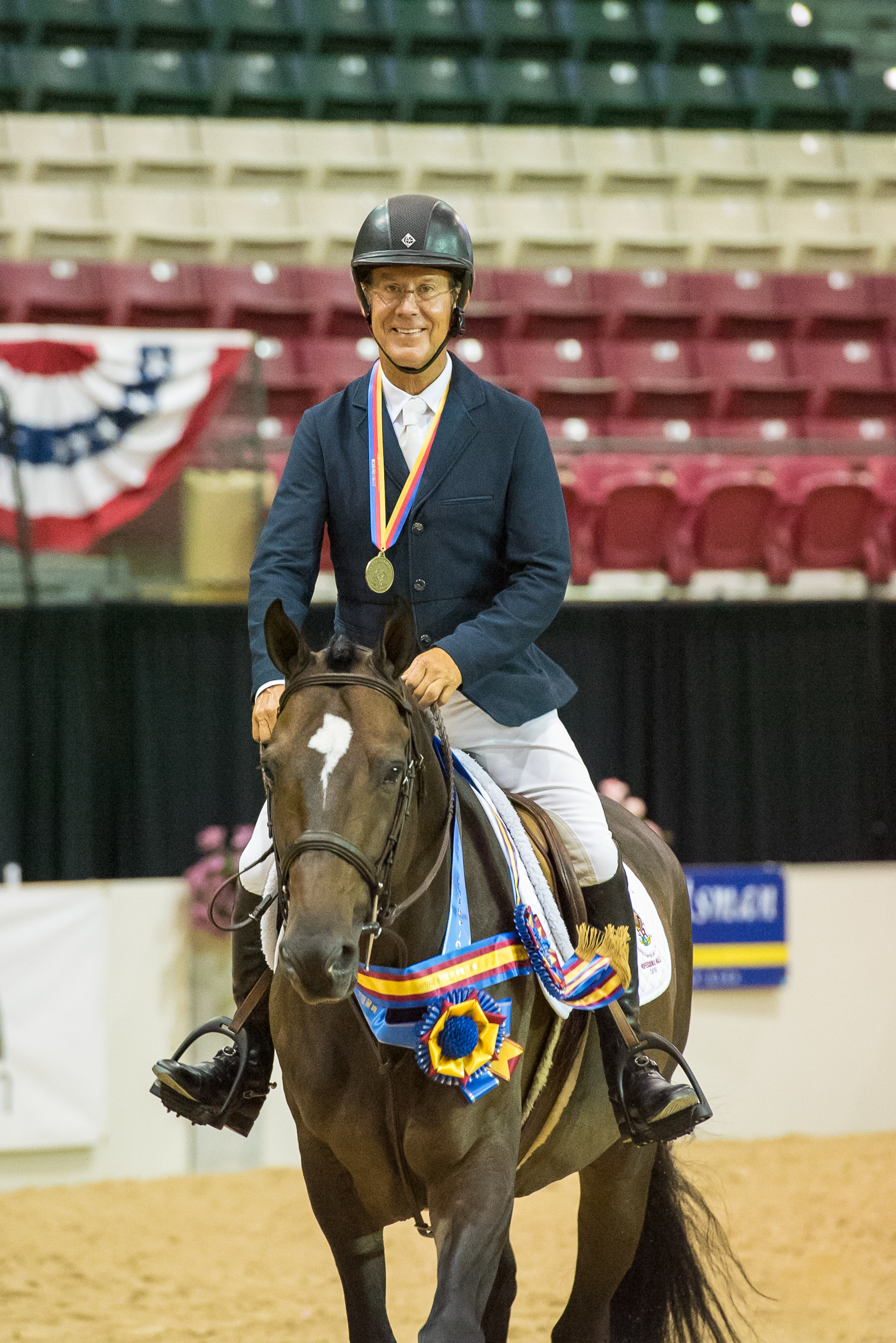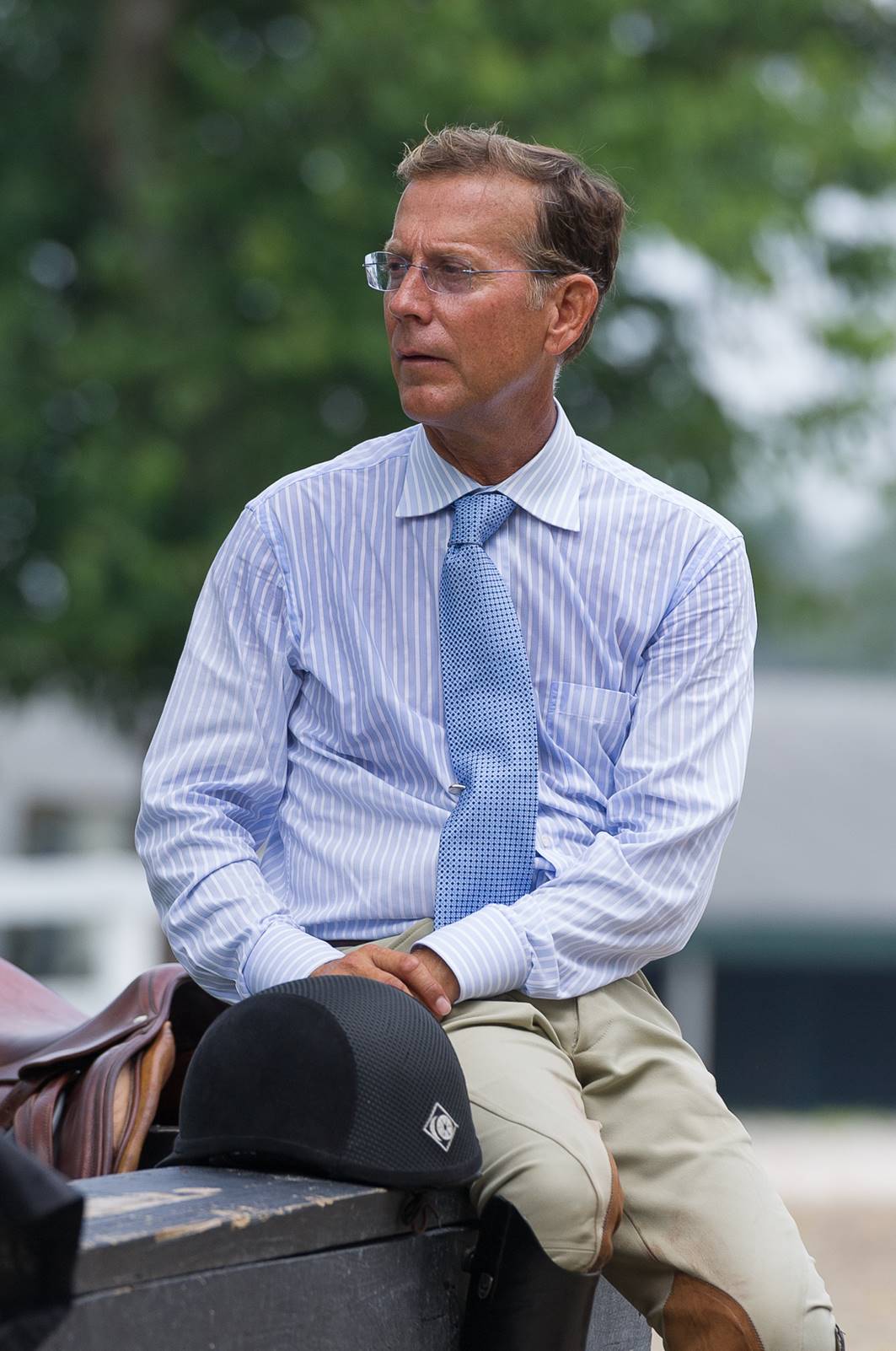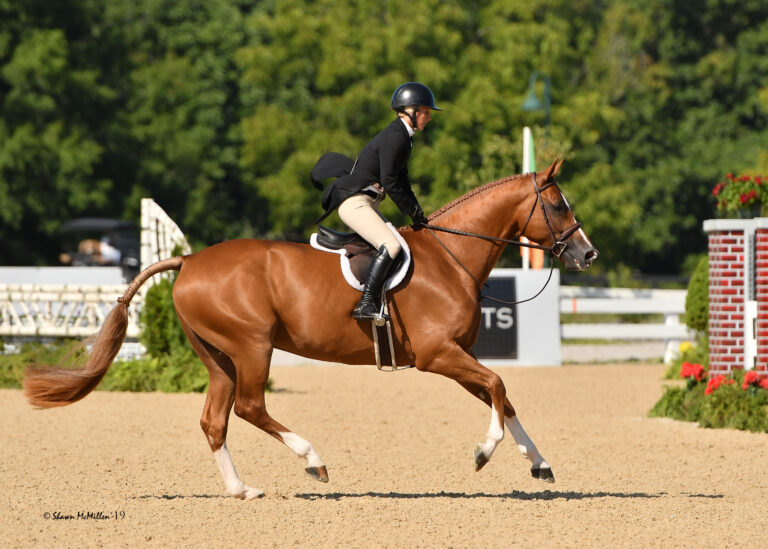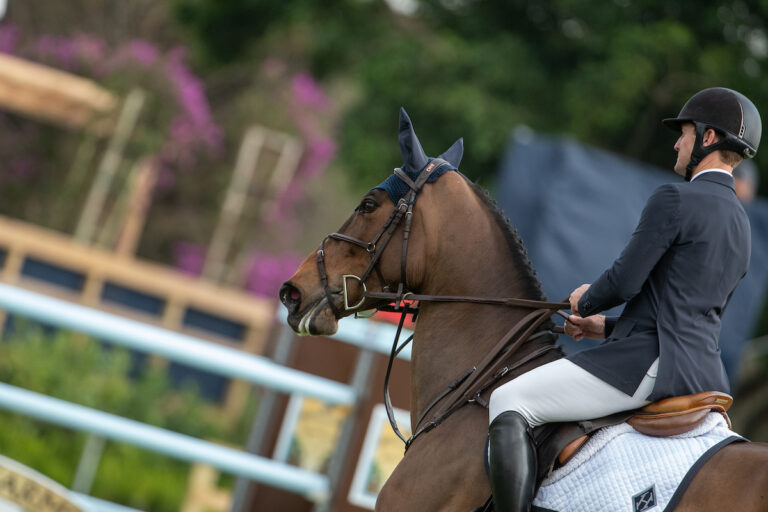
Trainers refer to John French as “the human tranquilizer” for his ability to patiently pilot talented horses to championship rounds. He is one of the most accomplished hunter riders in the industry and is recognizable at the top shows for both his quiet demeanor and the long list of quality horses he has to ride.
John grew up foxhunting and riding cross country with his parents in Maryland and as a young child rode a “succession of ponies, many of whom bucked me off.” As a teenager, he wasn’t sure he wanted to keep riding and showing, but eventually some supportive words from George Morris encouraged him to stay with the sport. He turned professional in 1981, moved to California in 1987 and never looked back.
John is the winner of thousands of championship classes. In 2009, he and Rumba won the inaugural USHJA International Hunter Derby Championship in a performance that dazzled the judges and the industry. He is the four-time winner of the USHJA World Championship Hunter Rider Professional Finals, in 2000, 2006, 2011 and 2016. In 2012, he was awarded the WCHR Lifetime Achievement Award.
John travels more than 35 weeks each year on the A-circuit, catch-riding for many of the top owners in the country. He also runs an active show barn in central California.
Question: How did you develop your amazing timing?
John French: I loved jumping as a kid and practicing cross country. When you ride a small pony and you are jumping post-and-rail fences, you have to get pretty accurate with your timing. I used to get in trouble. My mom would leave me in the ring and, if she wasn’t looking, I would jump my pony in and out of the arena and hope I wouldn’t get caught.
I didn’t have top show horses or ponies as a kid. I rode Shetland ponies, Quarter Horses, Arabians or a boarder’s horse. I had the opportunity to ride so many different kinds of horses and I think that is how I learned.
Q: Did you always know you’d be a professional rider?
JF: Growing up, I saw top riders and trainers, but I never thought I could be one of them because I didn’t have the financial resources to have nice horses or ride with the best trainers.
I gave up riding for a whole summer. I was riding a not-very-attractive 15.2-hand palomino. I couldn’t understand why I would go to A shows and not get ribbons. It was frustrating. I wanted it so bad and I felt like it wasn’t going to happen for me because I wasn’t going to have those kinds of horses.
I had sent my picture in to Practical Horseman for the George Morris critique, and it ended up in the magazine. George wrote that my horse was not a good jumper. But he was very complimentary of my riding. And in the last paragraph, he said, “All in all, this is the best example of classic hunter seat equitation I’ve ever seen.”
So I wanted to try again. I borrowed a nicer horse and took him to the Maryland Equitation Finals. I trailered him to the show, braided him myself, trained myself and won. And I was 16 years old! After that, people started noticing me, seeing I was working hard. They started giving me horses to ride. So if it wasn’t for George, I wouldn’t be here today.
Q: What advice would you have given yourself as a 20-year-old?
JF: I wish I had gone to college. I began riding as a professional very quickly and I’m not sure I was ready for it. I missed out on the social part of college. And I think everyone should have something to fall back on. But once I started riding professionally, I had to say, “There’s no falling back because you are in it now.”

Q: Do you have a routine before a big competition?
JF: If you have too much going on in your head, you can’t feel what’s going on with the horse. If I have time, I go back to the hotel. If I can get 15 minutes to sit alone, I can get into that frame of mindfulness.
I might get a couple of sentences out of a book, something that I can remember right before I go in the ring that takes my mind off of trying to win. I will go in the ring and tell myself, “You are so lucky to do this.” Or I think, “It doesn’t matter whether you win or lose, just be grateful.” It relaxes me and then I can get into the zone.
I’ve been meditating for 18 years and have attended meditation and spiritual retreats. In 2000, I went on a retreat that helped me in meditating and made me realize what is important in life.
I came back, went to the Capital Challenge Horse Show and won the World Hunter Rider for the first time. Honestly, winning didn’t seem as important to me. When you have that sense of calmness about you and you are grateful, it helps you do your best. I don’t know that I would have won without going on that retreat.
Q: What is your greatest weakness?
JF: As a professional, I used to always try to make people happy. I always wanted people to like me as a rider and trainer. If anybody ever said anything bad about me or had a disagreement, it really bothered me. I used to let people walk all over me because I was afraid to say “no” and disappoint somebody.
It has taken me a long time to realize that you can’t make everybody happy and not everyone is going to like you. I’ve learned that instead of trying to make people happy, find out what makes YOU happy. Then you will be better working with other people because you have that confidence.
Q: And what is your greatest strength?
JF: I am a very calm person and sensitive person. I think people feel comfortable telling me things. I don’t have a lot of problems with people because I can sense that they might want to be treated a certain way. Everyone wants to be treated a little bit differently. I think I learned that from the horses, and it carries over to people.
Q: After all these championships, what does winning mean to you?
JF: You know, as a teenager, you have a hard time. People are judging you. You have insecurities. Luckily, I had riding and if I was feeling bad about myself, riding made me feel like somebody.
I am super competitive. But I learned that feeling good from winning only lasts until the next competition. That is why you cannot see winning as a way to feel good all the time. It has to come from within.
It makes you feel good when you have a horse that you brought along and the judges recognize that this is a nice horse. When I win now, I am actually more excited for the horse than I am for myself.
Q: Was your success a surprise to you?
JF: It was a surprise. I was lucky to be in the right place at the right time. Maybe if I had stayed in Maryland it wouldn’t have happened for me. I am very grateful for the people that have come along and the rides that I have gotten.
I never thought I would have a horse like Rumba or win the derby finals. We decided at the very last minute to bring him to the finals because I had thought, “Really, we are going to bring him all the way there? It will cost a lot of money. What if we don’t win a ribbon?” But we brought him and he won.
Q: What is it about catch-riding that you like?
JF: A lot of people don’t want to do it. For me it’s fun because it is a challenge to get on a horse I don’t know and try to figure him out quickly. When you get on you don’t have all these preconceived notions that “this horse does this or does that.” You are just going off of the feeling. You are riding in your subconscious and just riding the horse.
Q: What is your secret for always finding a good distance?
JF: First, you have to try not to be so much in your head. Just let your subconscious take over.
Then once you are riding down to the fence, you can’t have any doubt. If you get to a jump and you say, “Where is the distance? I hope I see it.”—that’s doubt. And that is thinking too much.
But if you are confident, you can say to yourself, “I have no doubt that a rideable distance will appear.” You can practice that.
Q: How would you describe your style of riding?
JF: It’s not very controlling. I ride a little looser, more forward. I try to not interfere. I don’t overtrain. I think sometimes people do too much and you can take the jump out of a horse.
Q: Why do horses respond to you so well?
JF: I think it is because I don’t put a lot of pressure on horses.
Over time, you learn how much to push each horse. You can’t expect changes overnight, and each horse is different. My goal is to know how much to push and keep the horse happy at the same time. Every horse has his strength and weakness and if you only work on the weakness, a horse starts to not enjoy his work. If he enjoys it, then when it really matters you can push him that extra little bit. And it is then that they want to do it for you and make you happy.
Every horse likes to go a different way. You have to see the way the horse is put together and his way of moving. I get on a horse and figure out how soft he needs to be ridden and whether he can go in a longer frame or if he needs to be ridden more leg to hand in a frame to get that strength and balance. Since I ride so many different horses, sometimes I will get on a horse and recognize that this horse feels just like another horse I may have ridden. And I try to recreate that ride if it worked in the past.
Q: What would you like to change about the hunter/jumper industry?
JF: It’s gotten too expensive. I would make it like Europe, where it doesn’t cost as much money. Nowadays it is better to keep young horses over in Europe and have them do some shows, as the shows here cost so much money.
When I was a kid there were so many nice schooling shows and now there are fewer. The A shows have gotten bigger and bigger. You go to A shows with classes that have cross rails and poles on the ground. Those people should be learning somewhere else. And they should be riding with the young trainers, giving them a chance.
Q: Is this still a good business for young professionals?
JF: If they love horses and this is their passion, there is no reason not to get into it. But our industry isn’t regulated, and some people get into it because they think they can make a lot of money. They think they can sell a couple horses, tack on some money and be a big hit.
But if you want to be in this for the long run then I think you have to do it because you love the horses. Don’t get greedy. If you do right by someone, people will come back to you. And you will have a career and a long time in this business.
Q: Is there a saying that means a lot to you?
JF: Have an attitude of gratitude.
Q: Do you participate in other sports?
JF: I like danger. There is always a little bit of a thrill if something is dangerous to me. I would go skiing, but I wouldn’t want to do it easy. I would want to go off a ramp and fly through the air. That is why I don’t do other sports because I would probably kill myself.
Q: What has been the best moment of your life?
JF: It’s only just beginning, but I finally bought a farm. It’s in Paso Robles in California. It’s only 12 acres, but that is big for California. It’s in a very horsey area. It has a nice house that sits up on a ridge and is lined with oak trees around the whole property. You see the lights of the other houses in the area, so it’s not remote. And I have a family of foxes that lives in the front field.
It’s a magical place. I am going to be able to make it the place where I want to be. It is the most exciting thing that I’ve done. I can visualize how I want to live later in life. I can see that in this place.
Q: What have you learned along the way?
JF: Sometimes people don’t intend to be mean. Sometimes, just like it is with horses, it’s how they were brought up and how they were treated. They might have a weakness, but it might be because of something that has happened to them. I can see that weakness, but I know there is another side and I am always looking for that.
Try to always find the good. People don’t want to be bad. And neither do horses.
This article was originally published in the February 2017 issue of Practical Horseman.










